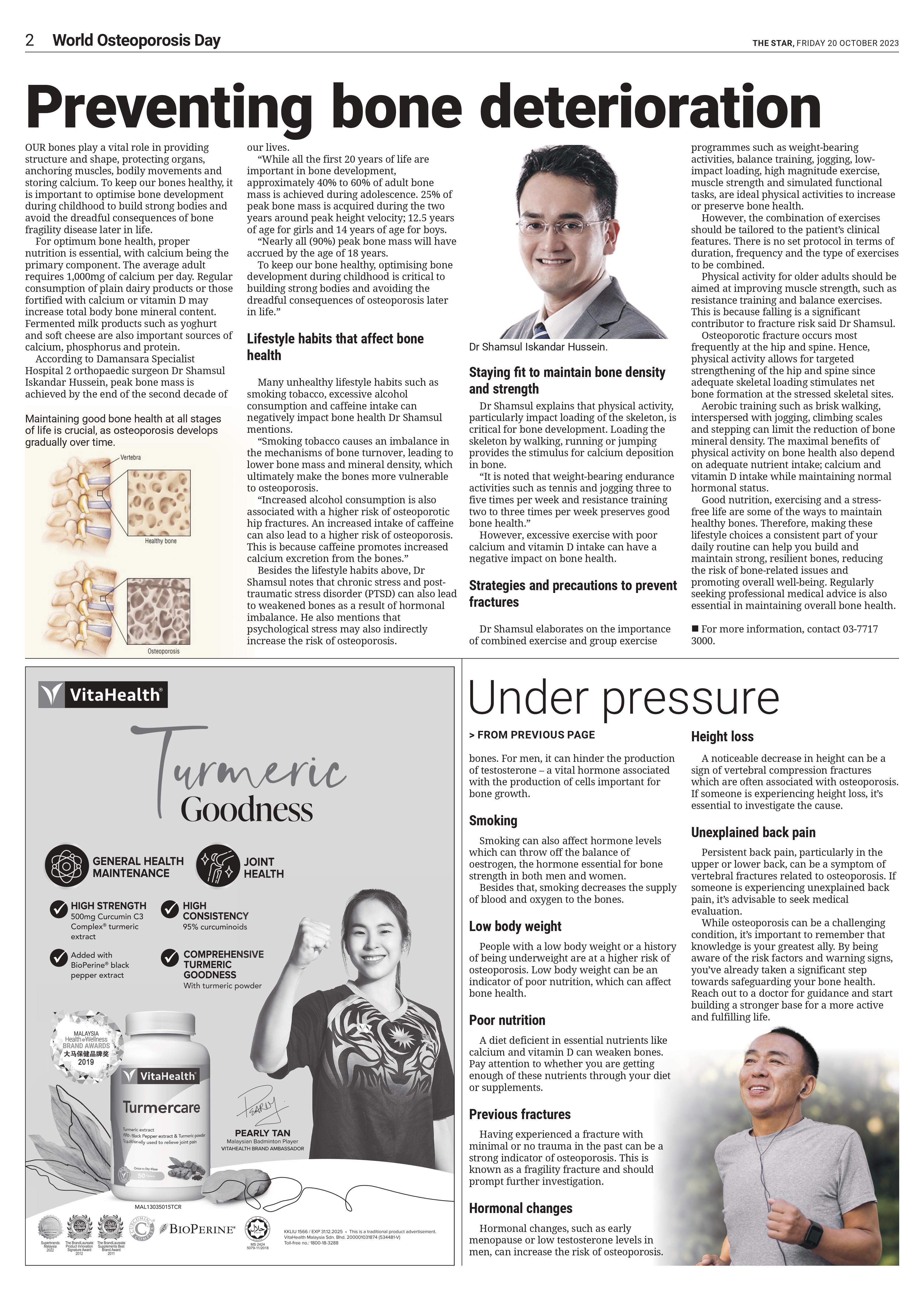Preventing Bone Deterioration

Preventing Bone Deterioration
OUR bones play a vital role in providing structure and shape, protecting organs, anchoring muscles, bodily movements and storing calcium. To keep our bones healthy, it is important to optimise bone development during childhood to build strong bodies and avoid the dreadful consequences of bone fragility disease later in life. For optimum bone health, proper nutrition is essential, with calcium being the primary component.
The average adult requires 1,000mg of calcium per day. Regular consumption of plain dairy products or those fortified with calcium or vitamin D may increase total body bone mineral content. Fermented milk products such as yoghurt and soft cheese are also important sources of calcium, phosphorus and protein.
According to Damansara Specialist Hospital 2 orthopaedic surgeon Dr Shamsul Iskandar Hussein, peak bone mass is achieved by the end of the second decade of our lives. “While all the first 20 years of life are important in bone development, approximately 40% to 60% of adult bone mass is achieved during adolescence. 25% of peak bone mass is acquired during the two years around peak height velocity; 12.5 years of age for girls and 14 years of age for boys. “Nearly all (90%) peak bone mass will have accrued by the age of 18 years. To keep our bone healthy, optimising bone development during childhood is critical to building strong bodies and avoiding the dreadful consequences of osteoporosis later in life."
Lifestyle habits that affect bone health
Many unhealthy lifestyle habits such as smoking tobacco, excessive alcohol consumption and caffeine intake can negatively impact bone health Dr Shamsul mentions. “Smoking tobacco causes an imbalance in the mechanisms of bone turnover, leading to lower bone mass and mineral density, which ultimately make the bones more vulnerable to osteoporosis. “Increased alcohol consumption is also associated with a higher risk of osteoporotic hip fractures.
An increased intake of caffeine can also lead to a higher risk of osteoporosis. This is because caffeine promotes increased calcium excretion from the bones.” Besides the lifestyle habits above, Dr Shamsul notes that chronic stress and post-traumatic stress disorder (PTSD) can also lead to weakened bones as a result of hormonal imbalance. He also mentions that psychological stress may also indirectly increase the risk of osteoporosis.
Strategies and precautions to prevent fractures
Dr Shamsul explains that physical activity, particularly impact loading of the skeleton, is critical for bone development. Loading the skeleton by walking, running or jumping provides the stimulus for calcium deposition in bone. “It is noted that weight-bearing endurance activities such as tennis and jogging three to five times per week and resistance training two to three times per week preserves good bone health.”However, excessive exercise with poor calcium and vitamin D intake can have a negative impact on bone health.
Osteoporotic fracture occurs most frequently at the hip and spine. Hence, physical activity allows for targeted strengthening of the hip and spine since adequate skeletal loading stimulates net bone formation at the stressed skeletal sites. Aerobic training such as brisk walking, interspersed with jogging, climbing scales and stepping can limit the reduction of bone mineral density.
The maximal benefits of physical activity on bone health also depend on adequate nutrient intake; calcium and vitamin D intake while maintaining normal hormonal status. Good nutrition, exercising and a stress-free life are some of the ways to maintain healthy bones. Therefore, making these lifestyle choices a consistent part of your daily routine can help you build and maintain strong, resilient bones, reducing the risk of bone-related issues and promoting overall well-being. Regularly seeking professional medical advice is also essential in maintaining overall bone health.
Source: The Star Special
For more information, contact 03-7717 3000.




 Promotion
Promotion
 Find Doctor
Find Doctor


